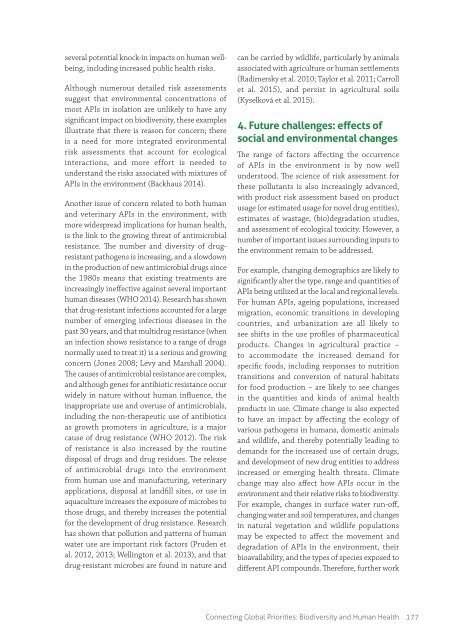Connecting Global Priorities Biodiversity and Human Health
1ZcgwtN
1ZcgwtN
You also want an ePaper? Increase the reach of your titles
YUMPU automatically turns print PDFs into web optimized ePapers that Google loves.
several potential knock-in impacts on human wellbeing,<br />
including increased public health risks.<br />
Although numerous detailed risk assessments<br />
suggest that environmental concentrations of<br />
most APIs in isolation are unlikely to have any<br />
significant impact on biodiversity, these examples<br />
illustrate that there is reason for concern; there<br />
is a need for more integrated environmental<br />
risk assessments that account for ecological<br />
interactions, <strong>and</strong> more effort is needed to<br />
underst<strong>and</strong> the risks associated with mixtures of<br />
APIs in the environment (Backhaus 2014).<br />
Another issue of concern related to both human<br />
<strong>and</strong> veterinary APIs in the environment, with<br />
more widespread implications for human health,<br />
is the link to the growing threat of antimicrobial<br />
resistance. The number <strong>and</strong> diversity of drugresistant<br />
pathogens is increasing, <strong>and</strong> a slowdown<br />
in the production of new antimicrobial drugs since<br />
the 1980s means that existing treatments are<br />
increasingly ineffective against several important<br />
human diseases (WHO 2014). Research has shown<br />
that drug-resistant infections accounted for a large<br />
number of emerging infectious diseases in the<br />
past 30 years, <strong>and</strong> that multidrug resistance (when<br />
an infection shows resistance to a range of drugs<br />
normally used to treat it) is a serious <strong>and</strong> growing<br />
concern (Jones 2008; Levy <strong>and</strong> Marshall 2004).<br />
The causes of antimicrobial resistance are complex,<br />
<strong>and</strong> although genes for antibiotic resistance occur<br />
widely in nature without human influence, the<br />
inappropriate use <strong>and</strong> overuse of antimicrobials,<br />
including the non-therapeutic use of antibiotics<br />
as growth promoters in agriculture, is a major<br />
cause of drug resistance (WHO 2012). The risk<br />
of resistance is also increased by the routine<br />
disposal of drugs <strong>and</strong> drug residues. The release<br />
of antimicrobial drugs into the environment<br />
from human use <strong>and</strong> manufacturing, veterinary<br />
applications, disposal at l<strong>and</strong>fill sites, or use in<br />
aquaculture increases the exposure of microbes to<br />
those drugs, <strong>and</strong> thereby increases the potential<br />
for the development of drug resistance. Research<br />
has shown that pollution <strong>and</strong> patterns of human<br />
water use are important risk factors (Pruden et<br />
al. 2012, 2013; Wellington et al. 2013), <strong>and</strong> that<br />
drug-resistant microbes are found in nature <strong>and</strong><br />
can be carried by wildlife, particularly by animals<br />
associated with agriculture or human settlements<br />
(Radimersky et al. 2010; Taylor et al. 2011; Carroll<br />
et al. 2015), <strong>and</strong> persist in agricultural soils<br />
(Kyselková et al. 2015).<br />
<br />
social <strong>and</strong> environmental changes<br />
The range of factors affecting the occurrence<br />
of APIs in the environment is by now well<br />
understood. The science of risk assessment for<br />
these pollutants is also increasingly advanced,<br />
with product risk assessment based on product<br />
usage (or estimated usage for novel drug entities),<br />
estimates of wastage, (bio)degradation studies,<br />
<strong>and</strong> assessment of ecological toxicity. However, a<br />
number of important issues surrounding inputs to<br />
the environment remain to be addressed.<br />
For example, changing demographics are likely to<br />
significantly alter the type, range <strong>and</strong> quantities of<br />
APIs being utilized at the local <strong>and</strong> regional levels.<br />
For human APIs, ageing populations, increased<br />
migration, economic transitions in developing<br />
countries, <strong>and</strong> urbanization are all likely to<br />
see shifts in the use profiles of pharmaceutical<br />
products. Changes in agricultural practice –<br />
to accommodate the increased dem<strong>and</strong> for<br />
specific foods, including responses to nutrition<br />
transitions <strong>and</strong> conversion of natural habitats<br />
for food production – are likely to see changes<br />
in the quantities <strong>and</strong> kinds of animal health<br />
products in use. Climate change is also expected<br />
to have an impact by affecting the ecology of<br />
various pathogens in humans, domestic animals<br />
<strong>and</strong> wildlife, <strong>and</strong> thereby potentially leading to<br />
dem<strong>and</strong>s for the increased use of certain drugs,<br />
<strong>and</strong> development of new drug entities to address<br />
increased or emerging health threats. Climate<br />
change may also affect how APIs occur in the<br />
environment <strong>and</strong> their relative risks to biodiversity.<br />
For example, changes in surface water run-off,<br />
changing water <strong>and</strong> soil temperatures, <strong>and</strong> changes<br />
in natural vegetation <strong>and</strong> wildlife populations<br />
may be expected to affect the movement <strong>and</strong><br />
degradation of APIs in the environment, their<br />
bioavailability, <strong>and</strong> the types of species exposed to<br />
different API compounds. Therefore, further work<br />
<strong>Connecting</strong> <strong>Global</strong> <strong>Priorities</strong>: <strong>Biodiversity</strong> <strong>and</strong> <strong>Human</strong> <strong>Health</strong><br />
177


